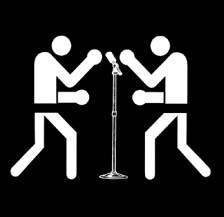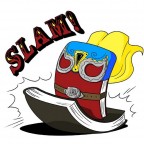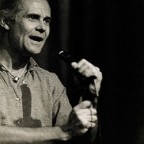In our latest Inventions Podcast, we talked about slam poetry and even got to hear a sweet demo from one of our members. Marc Kelly Smith is the founder of slam poetry and hosts the Uptown Poetry Slam at the Green Mill. I was able to contact Marc and ask him about some of his thoughts on performance, how improv relates to slam poetry, and a few silly things. The answers he has provided me with are truly amazing, and I am now an even bigger fan of Marc Kelly Smith. Here’s what the Slam Papi had to say:
Q: Your poetry is known for being gritty, honest, and groundbreaking. In improv, we also strive to take risks and be honest rather than funny. What do you think the importance of honesty is in performance?
 A: Lots of slammers (like politicians, preachers, and other public speakers) learn to fake sincerity. They borrow and emote ideas and emotions they do not truly hold dear. They do so to get over on an audience, to gain applause, admiration, and approval, as well as coin for sell whatever they’re selling. It’s all premeditated. When you’re operating in the moment without conscious thinking, moved more by instinct (or by what the Buddhists call the Big Mind) than by what you think will please the audience, then it can’t help but be honest because it’s happening without any other agenda than to just be. The calculating performer who uses his text and actions as an emotional and intellectual manipulation is no better than a propagandist or a politician who says what he needs to say to get your vote.
A: Lots of slammers (like politicians, preachers, and other public speakers) learn to fake sincerity. They borrow and emote ideas and emotions they do not truly hold dear. They do so to get over on an audience, to gain applause, admiration, and approval, as well as coin for sell whatever they’re selling. It’s all premeditated. When you’re operating in the moment without conscious thinking, moved more by instinct (or by what the Buddhists call the Big Mind) than by what you think will please the audience, then it can’t help but be honest because it’s happening without any other agenda than to just be. The calculating performer who uses his text and actions as an emotional and intellectual manipulation is no better than a propagandist or a politician who says what he needs to say to get your vote.
Q: You have said that commercial exploitation of poetry (such as Def Poetry Jam) has diminished the value of performance poetry. Do you believe that any type of performance, including improvisation, loses meaning and value when it is made commercial and leaves the bars and back rooms?
A: I think that it is self-evident that the crass commercial exploitation of artistic endeavors, especially in the realms of music and spoken word, has had a detrimental effect on the aesthetic power of Art. I do not follow improv enough to speak about it, but in my world, the slam world, shows like Def Jam focus a very narrow lens what slam is all about.
Commercialized art is about one thing, making money. The artists for the most part trade in their desire to speak “the truth as they see it no matter what” for ideas and styles their producers and handlers deem profitable. Their motivation gets redirected toward the pursuit of celebrity status and dollar signs, and only a few ever get there. While they’re scrambling to beat out the other aspirants they often lose their integrity and identity only to end up in the has-been column.
The slam has created an international family of performing artists, writers, organizers, and audience member who exist and work on a horizontal plane, local, from the bottom out not up to look down from.
Q: One of the golden rules of improvisation is “yes, and,” meaning you accept what others do and support them further. I remember once when you performed at my high school, you climbed up onto the banister for fun! How do you use “yes, and” or improvisation while you are performing?
A: I think all professional performers never deny what’s happening around them during their performances. If you do the audience sees it as fakery on your part. If someone stands up and belches in the first row you’d better work that belch into the bit, poem, or scene you’re trying to get across to the audience. Saying yes is not just yes to your fellow performers, it’s yes to the reality of everything that’s happening in your immediate surroundings. My performances have always confronted audiences and encouraged them to interact, to speak out. It can be challenging (sometimes dangerous) to grant such a freedom to the masses, but I prefer that to the passive audience that assumes the posture and attitude of staring at a TV screen. Once again, being in (and accepting) the present moment is what counts.
 Q: One of the members of Octavarius used to use his own slam poetry as his voicemail recording. What would you say in response to that?
Q: One of the members of Octavarius used to use his own slam poetry as his voicemail recording. What would you say in response to that?
A: Many slammers have done this. Sometimes it seems a bit self-focused. Sometimes it’s a fun treat. Sometimes it’s thought-provoking. I guess it depends on the motive behind the message.
Q: We have a silly tradition at Octavarius called “Will Smith Points.” What would you interpret that phrase to mean?
A: Now I feel like the poor student I was in school (and still am). I’m notoriously unhip to popular culture, but I do know Will Smith is an actor. … Ah I’ve cheated. I Googled the phrase and found out that it’s a game. But I still don’t understand it. I’m an old guy. Peace man.
Q: If you had one word of advice for young people in their early twenties trying to make it as poets, artists, and performers, what would it be?
 A: Find a group of like-minded colleagues to grow with them. Support them and be supported by them. Know that there are demons within your ego to be destroyed along the journey. Otherwise no matter how much success and notoriety you receive you’ll still feel alone and unworthy.
A: Find a group of like-minded colleagues to grow with them. Support them and be supported by them. Know that there are demons within your ego to be destroyed along the journey. Otherwise no matter how much success and notoriety you receive you’ll still feel alone and unworthy.
Wow, that is man of powerful words. I don’t know about you, but I definitely feel a bit more inspired after that. Marc Kelly Smith is an incredible poet, performer, teacher, and author. Check out his website at http://marckellysmith.com/ or check out one of the many books he has been a part of such as Crowdpleaser, Take the Mic, Stage a Slam, and The Spoken Word Revolution. Thank you, Marc, for your insightfulness! I am happy to know that two very different types of performance are actually very alike.